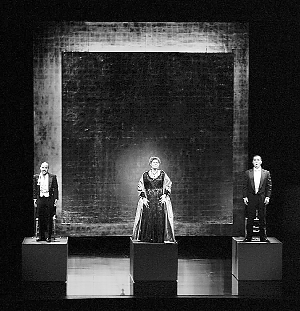New York’s conservatories offer excellent and rare operas into 2005
Those European arts writers who pity Manhattan opera goers as a pathetic herd forced endlessly to endure endless rounds of Zeffirelli’s “Carmen” and “Traviata” might have to rethink things. In 2004, the Metropolitan Opera included “Rodelinda” “I vespri siciliani” and “Cyrano de Bergerac” and the New York City Opera offered “Daphne” and “Orlando” while premiering Wuorinen’s “Haroun,” with other established companies soon to feature Thomas’ “Mignon” (the Opera Orchestra, featuring Stephanie Blythe), Handel’s “Arianna in Creta” (Gotham) and, in January, the world premiere of Robert Ward’s Ibsen-inspired “Claudia Legare” (Di Capo).
Even in lesser times for offbeat fare, the city’s conservatories can always be counted on to widen the local repertory.
The novelty in the Juilliard School’s double bill (December 10) stemmed from the rarely staged “scène lyrique” that netted Debussy his Prix de Rome in 1884, “L’enfant prodigue” (“The prodigal son”). Both Lincoln Center houses offer memorable stagings of Ravel’s “L’enfant et les sortilèges” (“The Child and the Enchantments”), so the need for Lilian Groag and John Conklin to showcase something new was greater.
The evening bore visual relation to the Dexter/Hockney “Parade” and Stravinsky triple bill—the Debussy made static and abstract, with the three leads placed on platforms, though quite ravishing, as lit by Matthew McCarthy and the Ravel explicitly centered on Dadaist vaudeville turns.
Conklin’s set for Colette’s little drama of childhood crisis and growth—the prototype for Maurice Sendak’s “Where the Wild Things Are”—was playfully allusive, with a particularly apt, huge Max Ernst pen-and-ink cutout of a winged matron—“Maman” herself?—initially dominating the proceedings. Maline Casta’s costumes were witty too—the Child (the energetic Christianne Rushton, admirable in cantilena passages but too brightly American of utterance in parlando protests and cries) was a kind of Fauntleroy prig. Amy Shoremount (Fire), an exuberantly loony, and eventually straitjacketed, figure reminiscent of Mireille Delunsch’s La Folie in the Paris Opéra “Platée,” showed somewhat hard-toned but fearless coloratura, with a killer trill—a Fiakermilli waiting to happen. There were two plangent-toned mezzos in Sasha Cook (Shepherd) and Isabel Leonard (Squirrel/White Cat); Leonard and Paul La Rosa looked and sounded a very sexy pair of felines.
The standout in “L’enfant prodigue” was the supple-voiced Puerto Rican lyric tenor Javier Abreu (Azaël), secure from top to bottom and projecting words well. As his parents, Melissa Shippen and Museop Kim showed promise, but proved more generic vocally. Juilliard’s operatic productions nearly always boast good ensemble work—the chorus sounded welcomingly fresh, and the stylish Yves Abel and his students ably conveyed what James Keller’s excellent program notes termed the “burgeoning lushness” of the Debussy and both the champagne sec string tone and the more obscure harmonies of this particular Ravel score. Plus, under Groag’s tutelage, the singers moved well and the dancers added credibly to the mix.
Several worthwhile post-romantic American works lost wandering among the tone rows for 40 years have lately resurfaced. The Manhattan School of Music Opera Theater affected a disarming re-entry for Lee Hoiby’s “A Month in the Country,” in a well-acted, finely judged production by Ned Canty that mined both the comedy and the tragedy of the Turgenev source. Hoiby’s opera is skillfully wrought, dramatically and musically, and held the attention of a capacity crowd on December 12 in the school’s Borden Auditorium near Columbia University.
Commissioned and first given (as “Natalia Petrovna”) by City Opera in 1964, the piece was revised and re-titled for a 1981 Boston production. Proto-Chekhovian rural indolence predominates; everyone talks too much, eluding happiness. Vera, Natalia Petrovna’s orphaned and impoverished ward, as per Turgenev, becomes her niece in the late William Ball’s libretto; accentuating the class difference in relation to the youthful tutor Belaev (whom both women fancy) and also—when she becomes an heiress—making it rather implausible that she would rush into a loveless marriage with a foolish middle-aged neighbor. The introduced trope of aunt/niece competition underlines Hoiby’s debt here to Samuel Barber’s “Vanessa” (with a libretto by and originally directed in 1958 by his mentor Menotti), also made plain by a diegetic song about birds and a concerted neo-Straussian—and very effective—final ensemble.
Ball also conflated the maid and the lady’s companion, and the German tutor and the nasty amoral doctor, into single characters, here delightfully embodied by the adept tenor Jon-Michael Ball and Adèle-ready soprano Vivian Krich-Britton. Their scenes, and those of the heroine’s bumbling husband (Alex Boyer, another tenor) could have derived from a higher class of old-style Broadway musical. Her mezzo keenly projected, Sarah Williams had a whale of a time as the battle-axe mother-in-law.
The four singers of the romantically interlocked main roles have a more challenging idiom, tending to arioso and with generally skillful setting of words. JennyRebecca Winans acted well and musically traced the heroine’s line, but this testing part wants more refulgent tone and dynamic scope—an Arabella. Her longtime suitor and soulmate Rakitin, a bald bit of self-portraiture by Viardot-Garçia’s faithful follower, was sympathetically sung by Charles Temkey. With a warm, resonant bass, Temkey showed perhaps the most career potential of the lot, though the top is not yet under full control. Incidentally, though some caviled at the singers’ youth, Turgenev’s Natalia Petrovna and Rakitin are meant to be 29 and 30 respectively.
Yoosun Park showed some of the charm and the ease in piano singing of Vera’s creator, Patricia Brooks; Liam Bonner’s gentle good looks suited Belaev well and he dealt at least capably with tessitura audibly recalling that wide-ranged champion of so much American opera, John Reardon. In fact, one left curious to hear another Reardon creation, Hoiby’s 1971 Tennessee Williams-derived “Summer and Smoke.”
Steven Osgood’s able conducting, in a lowered pit, guaranteed the afternoon’s considerable musical success.
Manhattan School takes seriously its role as curator of intriguing rarities. On April 11, 13 and 15, the school will offer Louis Spohr’s “Zemire und Azor,” an early Romantic treatment of “Beauty and the Beast.”
As for Juilliard, they mount another double bill February 16 and 18 led by Maestro Osgood: Puccini’s comedy “Gianni Schicchi” and Richard Wargo’s Chekhov-inspired 1993 “The Music Shop.” Then, on April 27, 29 and May 1, Julliard offers Smetana’s “Bartered Bride,” a fun, wonderful piece of music often underestimated.
David Shengold (shengold@yahoo.com) writes about opera for Time Out New York, Opera News, Opera and other venues.


































